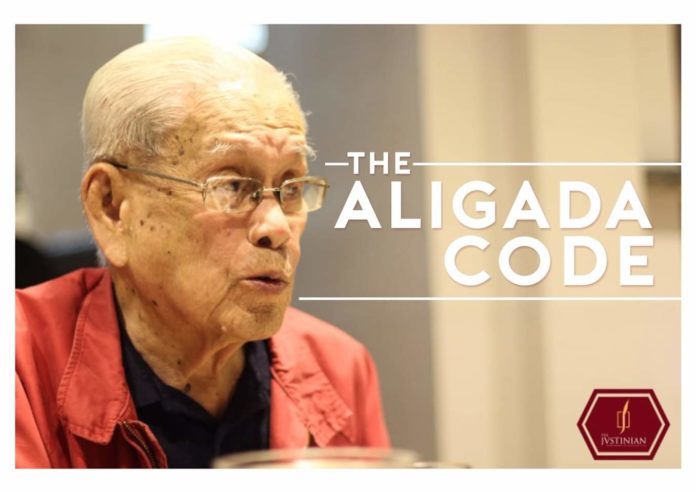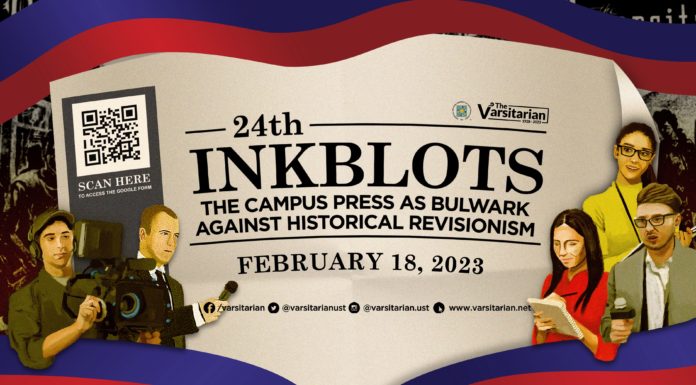IF PRACTICING what you preach is hard, why not try preaching what you practice? This is how lawyer and professor Augusto Aligada has done for almost 40 years now. Who else can master teaching Civil Law than he who spent almost his entire life as a vanguard and mentor of justice?
Aligada started his teaching profession in 1964 at the College of Commerce. Simultaneously, he was the College of Law secretary at Adamson University wherein he was one of those who reorganized the curriculum. Afterward, he started teaching at the Faculty and later was appointed the secretary of the Faculty of Civil Law by Chief Justice Andres Narvasa during the latter’s first term as dean. He met Chief Justice Narvasa during their days as law students and although they were not batchmates, (he is Batch 1953 and Narvasa is Batch 1951), they worked together for more than 20 years. Prior to that, he also worked with Attorney Marcos Herras, also a Thomasian.
Aligada was born in 1927 in Intramuros, Manila. He took up his primary and preparatory education in a public school. He later transferred to Araullo University for his secondary education, and then later to Colegio de San Juan de Letran. He finished high school in 1947 at the University of Santo Tomas, where he was among the first graduates after the war.
Aligada took up Associate in Arts, a two-year pre-law course at the then College of Liberal Arts. After six years in 1957, he finished Law. From then until 2001, he taught and practiced law.
Teaching devotion
Aligada is one of the longest-serving professors of the Faculty of Civil Law.
He teaches all Civil Law subjects from first to fourth year and is also a Bar reviewer, not only at the Faculty of Civil Law, but also in other review centers around the country. He is also a professor at the University of the East for over five years now.
Juggling between practicing and teaching was hard for Aligada. “I practice in the morning and then teach at night. It goes to say that what I practice in the morning, I teach at night,” he said.
For Aligada, his love for teaching has more weight than his desire to practice.
“I love to teach. Although I love to practice, I love teaching more,” he said.
For him, teaching has given him self-fulfillment and it has defined his being more than his work as a lawyer.
More than the pressure and disappointments that he gets from practice, what annoys him most is when he sees students who are not studying.
“What really pisses me off is when I see students who do not study, who are not serious in their work. That irritates me most,” he said. He hates seeing students who come to class unprepared.
Aligada learned the greatest lesson he has so far.
“Administration of justice,” he said. “We always aim at seeking justice done. But in teaching, it is different. You mold future lawyers. In other words, I become a creator of future lawyers.”
Augusto considers strictness as a special formula in molding the students well. “Strictness in their performance and pass those who deserve to pass,” the white-haired professor said.
He admits that he failed a lot of students especially those who do not want to enter his class. For him, it is a way to help them to be more diligent in their studies.
“At the moment, siguro they hate me. But later on they realize I was right,” he said.
For him, it is very important for a law student to be eloquent and fluent speakers in English since their primary tool in their profession is their mouth.
“Unlike doctors, their principal and primary weapon is their fingers,” Aligada said. “As a lawyer, you fight not with your fist, but with your brain through your mouth. Now, if you cannot explain yourself, how can you expect the judge to understand you? When you go to court, the judge knows nothing about your case. He and the jurors will only come to know about it for the first time from you. Without that ability, you can never win.”
Mentor of many
Most of Aligada’s students are now members of the bench. However, he does not feel insecure about his students’ achievements. Rather, he feels proud and honored that he was part of their formation as a lawyer.
“The more successful they are, the better I feel because I feel instrumental in every little way I was able to contribute in their success. No teacher will feel better,” he said.
The teachers are supposed to be more intelligent than the students, he believes.
Among his most gratifying moments at the Faculty was when a student passed the Bar because of his subject.
“One of the most gratifying moment I had was when a student who took the Bar came to me and told me that he failed in all subjects in the Bar except in his subject,” Aligada said. “He got line of six in all subjects but he got 92 in my subject. He wanted to kiss my shoes,” he added with a laugh.
His message to aspiring lawyers: “Knowledge of the law can be very powerful. You can be very dangerous man if you use it unwisely.”
He wants to remind students to study well in their stay at the Civil Law.
“Study. Study. Study. There is not substitute for preparation in the Bar,” he said. “Study, and everything will come smoothly.”
TAKING part in the formation of lawyers is hard, but molding them to become Christian lawyers is harder. Judge Philip Aguinaldo knows just that.
A proud Ilocano, Aguinaldo took up his elementary and high school education in Ilocos Norte. Later, he moved to Manila to take up Political Science at the Faculty of Arts and Letters. When he graduated in 1979, he whole-heartedly pursued law. A natural achiever, he became the first ever Central Student Council president after Martial Law was lifted in 1981. He graduated cum laude in 1983.
After college, Aguinaldo served the judicial administration system. He served as senior state prosecutor for the Witness Protection Program from 1993 to 2001. He became regional state prosecutor in Region 1 in San Fernando, La Union in 2001. He also served UST as legal consultant for student affairs from 1994 to 2002.
His love for his profession has led him to teach in the Faculty of Civil Law for almost two decades now.
However, Aguinaldo defines his work in a different way. “I consider teaching as a mission,” he said.
“I consider teaching harder because it involves the inculcation of legal ideas among the students,” he added.
His mission makes him a more responsible person and lawyer.
“Whatever mistakes that I may commit will be repeated by my students, which I don’t want to happen,” he said.
Years of practice has made Aguinaldo an expert in his own right in teaching subjects like Property, Partnership, Agency, Trust, Criminal Law, Criminal Procedure at the Faculty of Civil Law, and Legal Research and Ethics at the Faculty of Arts and Letters. He also gives lectures to Political Science and Legal Management majors.
Students of Professor Aguinaldo know his strict and idealistic standards.
“Some students say na very strict daw ako,” he said. “And in fact, I get low sa mga evaluations. In a scale of one to 10, I get 7.5. Hindi ako umaabot sa excellent, hanggang very satisfactory lang”
His method of teaching may not be appreciated by students, but he believes that this would help them become better lawyers someday.
“Right now they say that I am strict and a disciplinarian, but when they meet me after they have become lawyers they would appreciate what I did to them,” he said.
He makes it a point to do his own blend of teaching — mix value formation and the study of the law.
“In my explanations in class, I would always make it a point to inject examples on moral values,” Aguinaldo explained.
An iron-fisted professor, he is determined to pass only those students who deserve to. He fails an average of six to seven in a class of 35 students.
“At first, I thought the failure was on the part of the professor,” he said. “But I realized that it should be a part of the cleansing process in the Faculty of Civil Law because that is the best way to instill in the minds of the students that you mean business.”
He thinks that failing students is a way to remind them not to take their studies for granted.
“It is also a way to separate those who just come to study and those who really want to be lawyers.”
Since joining the Faculty of Civil Law in 1989, Aguinaldo has seen a stunning improvement in the quality of students and the curriculum.
“I think students have become better because of the better recruitment policies and the attraction of the Faculty has become so great as compared to the past years,” he said.
Then, students from the College of Commerce and the Faculty of Arts and Letters would go to other law schools like San Beda, Ateneo and UP. The entrance for freshmen law students has since toughened to single out those who are academically competent and deserving.
“I prefer to teach because it is the only way for me to maintain my idealism. Nobody forces you to be idealistic in the Faculty of Civil Law, but the Faculty could develop your values of idealism,” he said.
“Doon naman sa pagiging judge kung minsan you have to forsake some of your ideals particularly now that appointment in the judiciary is dictated by palakasan.”
His message to aspiring lawyers: “They have to study law to be Christian lawyers and to be good leaders of this country. Because of all the professions, only the field of law could prepare one to be a very good leader.” Julienne Therese S. Vilaluz

















